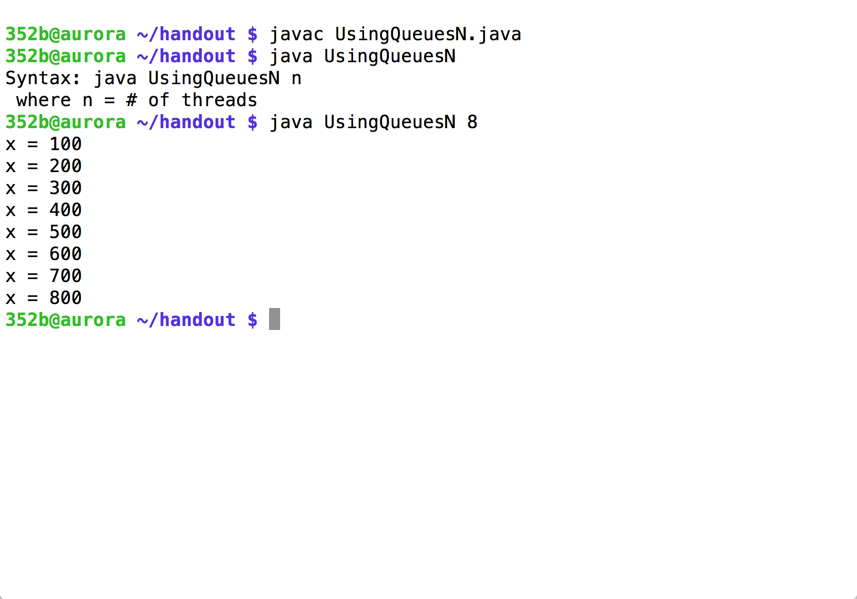CSC352: Defining Number of Threads at Execution Time
--D. Thiebaut (talk) 09:24, 21 February 2017 (EST)
Source
/* * UsingQueues.java * D. Thiebaut * * Illustrates how to use blocking queues to create a way for * threads to communicate with each other. */ import java.util.concurrent.ArrayBlockingQueue; import java.util.concurrent.BlockingQueue; public class UsingQueuesN { public static void main(String[] args) throws InterruptedException { if ( args.length < 1 ) { System.out.println( "Syntax: java UsingQueuesN n" ); System.out.println( " where n = # of threads" ); return; } int N = Integer.parseInt( args[0] ); BlockingQueue<Integer> toWorkersQ = new ArrayBlockingQueue<Integer>(2*N); BlockingQueue<Integer> fromWorkersQ = new ArrayBlockingQueue<Integer>(2*N); // create a worker and give it the two queues DemoThreadN[] threads = new DemoThreadN[N]; for ( int i=0; i<N; i++ ) { DemoThreadN t=new DemoThreadN( i, fromWorkersQ, toWorkersQ ); t.start(); threads[i] = t; } // wait 1/2 second try { Thread.sleep( 500 ); } catch (InterruptedException e) { e.printStackTrace(); } // send same amount of work to each worker for ( int i=0; i<N; i++ ) toWorkersQ.put( 100 ); // wait for answer back from worker for (int i=0; i<N; i++ ) { int x = fromWorkersQ.take(); // display the result System.out.println( "x = " + x ); } } } /** * DemoThread */ class DemoThreadN extends Thread { private BlockingQueue<Integer> sendQ; private BlockingQueue<Integer> receiveQ; private int Id; DemoThreadN( int Id, BlockingQueue<Integer> sendQ, BlockingQueue<Integer> receiveQ ) { this.Id = Id; this.sendQ = sendQ; this.receiveQ = receiveQ; } public void run(){ int x=0; // block until there's something in the queue try { x = receiveQ.take( ); } catch (InterruptedException e1) { e1.printStackTrace(); } // do some computation x = x*( Id + 1 ); // send results back try { sendQ.put( x ); } catch (InterruptedException e) { e.printStackTrace(); } } }
Output
